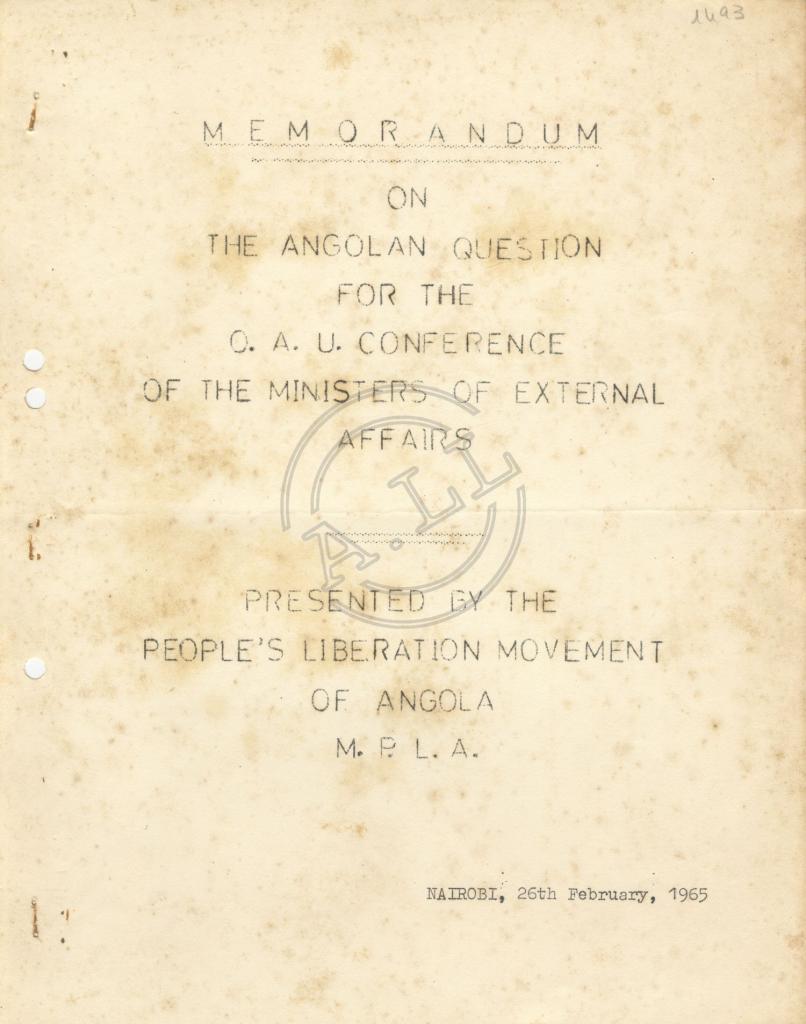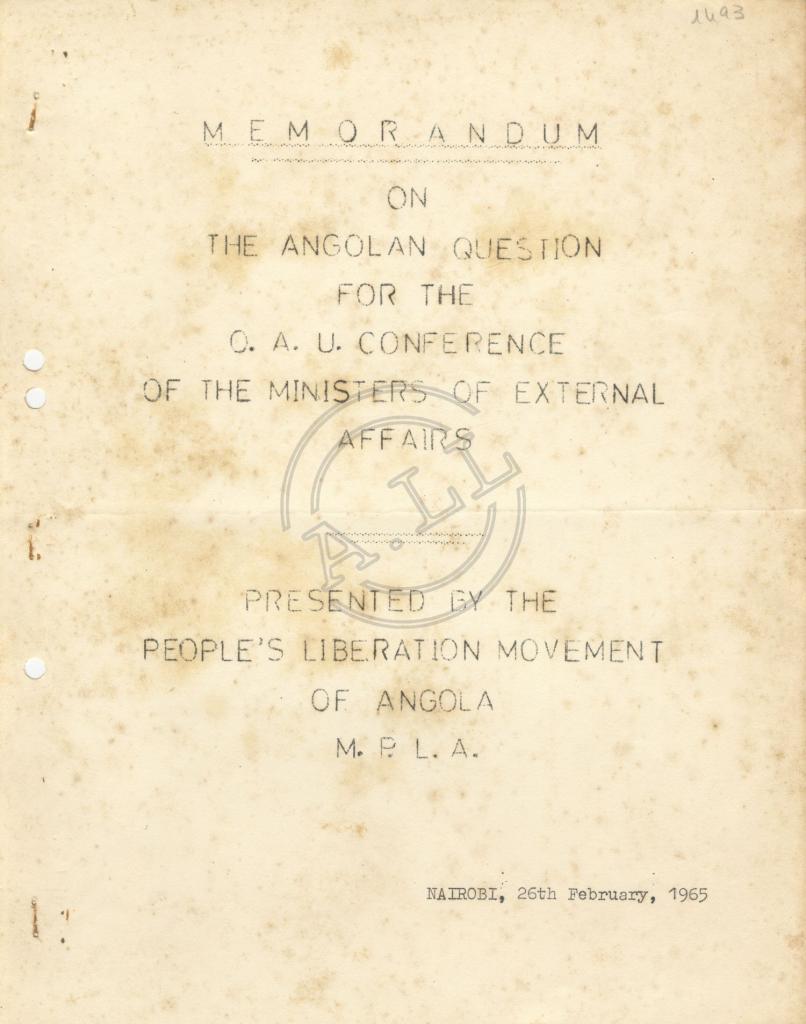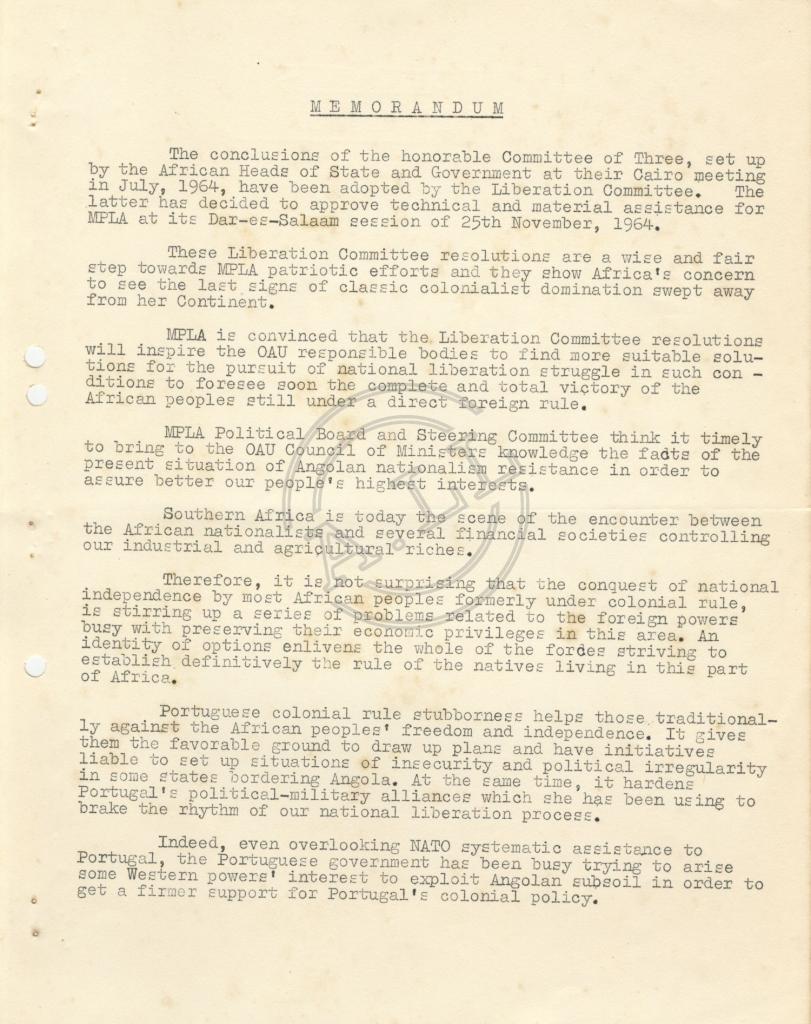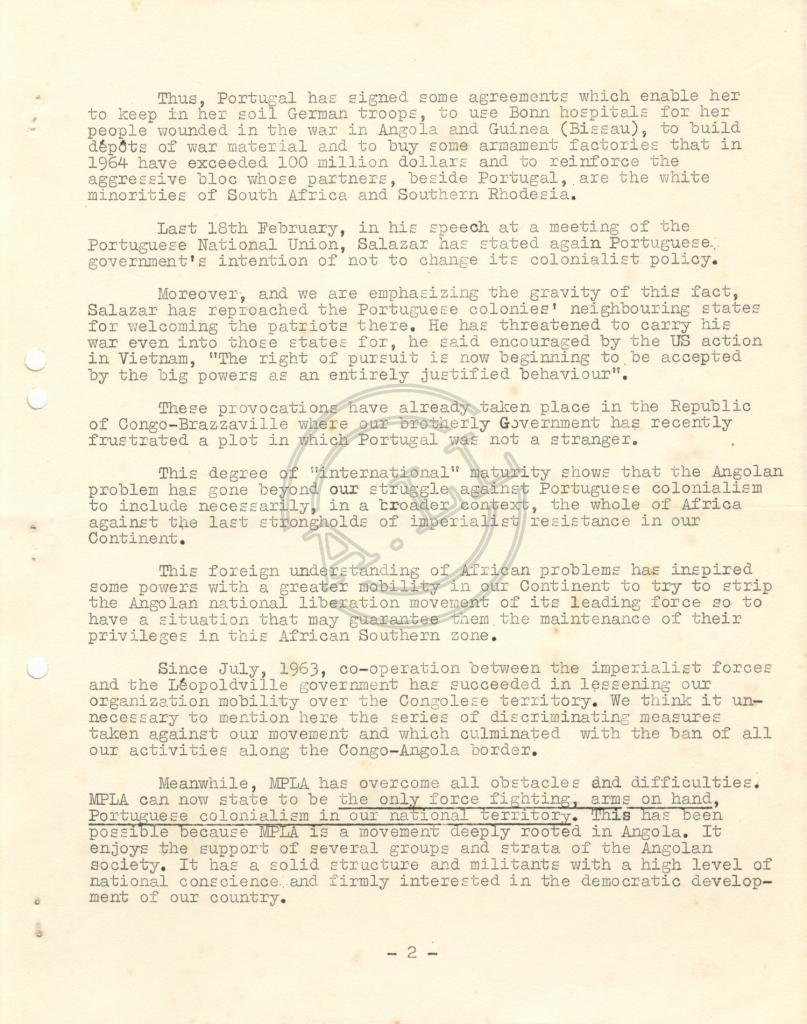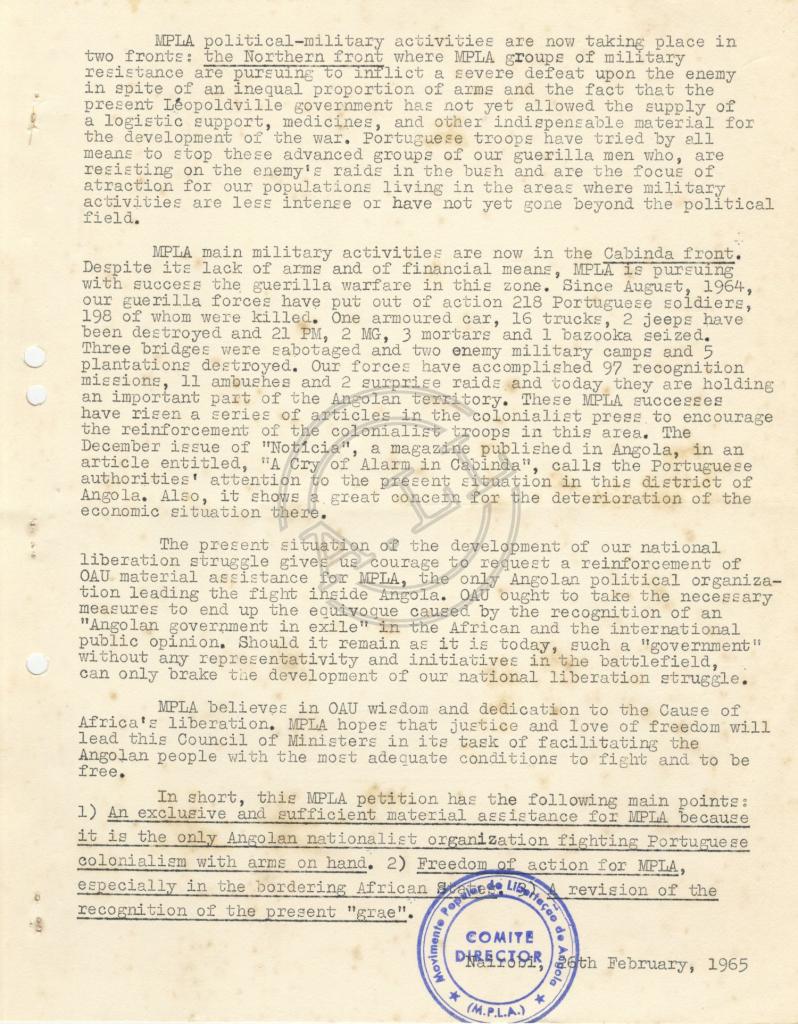MEMORANDUM
ON
THE ANGOLAN QUESTION
FOR THE
O.U.A. CONFERENCE
OF THE MINISTERS OF EXTERNAL AFFAIRS
PRESENTED BY THE
PEOPLE’S LIBERATION MOVEMENT
OF Angola
M.P.L.A.
Nairobi, 26th February, 1965
MEMORANDUM
The conclusions of the honorable Committee of Three, set up by the African Heads of State and Government at their Cairo meeting in July, 1964, have been adopted by the Liberation Committee. The latter has decided to approve technical and material assistance for MPLA at its Dar-Es-Salaam session of 25th November, 1964.
These Liberation Committee resolutions are a wise and fair step towards MPLA patriotic efforts and they show Africa’s concern to see the last signs of classis colonialist domination swept away from her Continent.
MPLA is convinced that the Liberation Committee resolutions will inspire the OAU responsible bodies to find more suitable solutions for the pursuit of national liberation struggle in such conditions to foresee soon the complete and total victory of the African peoples still under a direct foreign rule.
MPLA Political Board and Steering Committee think it timely to bring to the OAU Council of Ministers knowledge the facts of the present situation of Angolan nationalism resistance in order to assure better our people’s highest interests.
Southern Africa is today the scene of the encounter between the African nationalists and several financial societies controlling our industrial and agricultural riches.
Therefore, it is not surprising that the conquest of national independence by most African formerly under colonial rule, is stirring up a series of problems related to the foreign powers busy with preserving their economic privileges in this area. An identify of options enlivens the whole of the forces striving to establish definitively the rule of the natives living in this part of Africa.
Portuguese colonial rule stubbornness helps those traditionally against the African people’s freedom and independence. It gives them the favorable ground to draw up plans and have initiatives liable to set up situations of insecurity and political irregularity in some states bordering Angola. At the same time, it hardens Portugal’s political-military alliances which she has been using to brake the rhythm or our national liberation process.
Indeed, even overlooking NATO systematic assistance to Portugal, the Portuguese government has been busy trying to arise some Western powers: interest to exploit Angolan subsoil in order to get a firmer support for Portugal’s colonial policy.
Thus, Portugal has signed some agreements which enable her to keep in her soil German troops, to use Bonn hospitals for her people wounded in the war in Angola and Guinea (Bissau), to build dépôts of war material and to buy some armament factories that in 1964 have exceeded 100 million dollars and to reinforce the aggressive bloc whose partners, beside Portugal, are the white minorities of South Africa and Southern Rhodesia.
Last 18th February, in his speech at a meeting of the Portuguese National Union, Salazar has stated again Portuguese government’s intention of not to change its colonialist policy.
Moreover, and we are emphasizing the gravity of this fact, Salazar has reaproached the Portuguese colonies’ neighbouring states for welcoming the patriots there. He has threatened to carry his war even into those states for, he said encouraged by the US action in Vietnam, “The right of pursuit is now beginning to be accept by the big powers as an entirely justified behaviour".
These provocations have already taken place in the Republic of Congo-Brazzaville where our brotherly Government has recently frustrated a plot in which Portugal was not a stranger.
This degree of “international” maturity shows that the Angolan problem has gone beyond our struggle against Portuguese colonialism to include necessarily, in a broader context, the whole of Africa against the last strongholds of imperialist resistance in our Continent.
This foreign understanding of African problems has inspired some powers with a greater mobility in our Continent to try to strip the Angolan national liberation movement of its leading force so to have a situation that may guarantee them the maintenance of their privileges in this African Southern zone.
Since July, 1963, co-operation between the imperialist forces and the Léopoldville government has succeeded in lessening our organization mobility over the Congolese territory. We think it unnecessary to mention here the series of discriminating measures taken against our movement and which culminated with the ban of all our activities along the Congo-Angola border.
Meanwhile, MPLA has overcome all obstacles and difficulties. MPLA can now state to be the only force fighting, arms on hand, Portuguese colonialism in our national territory. This has been possible because MPLA is a movement deeply rooted in Angola. it enjoys the support of several groups and strata of the Angolan society. It has a solid structure and militants with a high level of national conscience and firmly interested in the democratic development or our country.
MPLA political-military activities are now taking place in two fronts: the Northern front, where MPLA groups of military resistance are pursuing to inflict a severe defeat upon the enemy in spite of an inequal proportion of arms and the fact that the present Léopoldville government has not yet allowed the supply of a logistic support, medicines, and other indispensable material for the development of the war. Portuguese troops have tried by all means to stop these advanced groups of our guerilla men who, are resisting on the enemy’s raids in the bush and are the focus of attraction for our populations living in the areas where military activities are less intense or have not yet gone beyond the political field.
MPLA main military activities are now in the Cabinda front. Despite its lack of arms and of financial means, MPLA is pursuing with success the guerilla warfare in this zone. Since August, 1964, our guerilla forces have put out of action 218 Portuguese soldiers, 198 of whom were killed. One armoured car, 16 trucks, 2 jeeps have been destroyed and 21 PM, 2 MG, 3 mortars and 1 bazooka seized. Three bridges were sabotaged and two enemy military camps and 5 plantations destroyed. Our forces have accomplished 97 recognition missions, 11 ambushes and 2 surprise raids and today they are holding an important part of the Angolan territory. These MPLA successes have risen a series of articles in the colonialist press to encourage the reinforcement of the colonialist troops in this area. The December issue of “Notícia”, a magazine published in Angola, in an article entitled, “A Cry of Alarm in Cabinda”, calls the Portuguese authorities’ attention to the present situation in this district of Angola. also, it shows a great concern for the deterioration of the economic situation there.
The present situation of the development of our national liberation struggle gives us courage to request a reinforcement of OAU material assistance for MPLA, the only Angolan political organization leading the fight inside Angola. OAU ought to take the necessary measures to end up the equivoque caused by the recognition of an “Angolan government in exile” in the African and the international public opinion. Should it remain as it is today, such a “government” without any representativity and initiatives in the battlefield, can only brake the development of our national liberation struggle.
MPLA believes in OAU wisdom and dedication to the cause of Africa’s liberation. MPLA hopes that justice and love of freedom will lead this Council of Ministers in its task of facilitating the Angolan people with the most adequate conditions to fight and to be free.
In short, this MPLA petition has the following main points:
1) An exclusive and sufficient material assistance for MPLA because it is the only Angolan nationalist organization fighting Portuguese colonialism with arms on hand. 2) Freedom of action for MPLA, especially in the bordering African States. 3) A revision of the recognition of the present “grae”.
Nairobi, 26th February, 1965
[carimbo do Comité Director]
«Memorandum on the angolan question for the OAU Conference of the Ministers of External Affairs»
